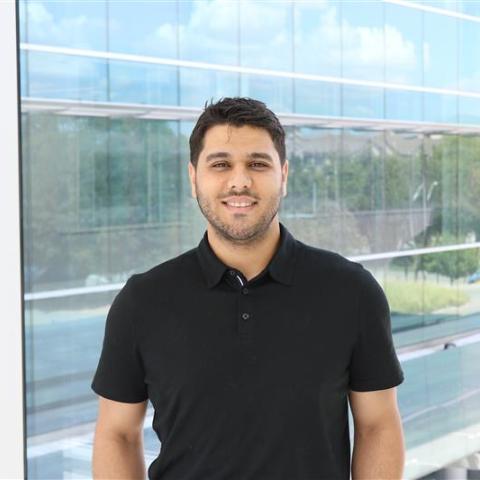
Ashish Ranjan, B.V.Sc., Ph.D., Principal Investigator
Dr. Ranjan is an Endowed Professor in the Department of Radiation Oncology. He also serves as Vice Chair for Comparative Oncology & Research Innovations and Director of the Veterinary Research and Oncology Clinic. He earned his B.V.Sc. degree (DVM equivalent) from Madras Veterinary College, in Chennai, India, followed by a Ph.D. in biomedical and veterinary sciences from Virginia Tech. Dr. Ranjan was then a visiting fellow at the Center for Interventional Oncology, Department of Radiology and Imaging Sciences at the National Institutes of Health (NIH).
Dr. Ranjan's research interests are in the application of device-directed nanoparticles for solid tumor chemo-immunotherapy. His lab is actively engaged in preclinical and bench-to-bedside veterinary clinical trials and has received funding from several federal, state, and private sources. Dr. Ranjan has received several distinguished awards, including the NIH Merit Award. He also serves on the Scientific Advisory Board of Focused Ultrasound Foundation, UK's Humanimal Trust, and NIH panels.

Faraz Chamani, Ph.D., Postdoctoral Researcher
Dr. Faraz Chamani earned his Ph.D. in electrical and computer engineering from Kansas State University in 2023. His research focused on in vitro measurement and mathematical modeling of hyperthermia-induced bioeffects in pancreatic cancer cells, contributing to the development of modeling tools for predictive treatment planning of thermal therapies and furthering understanding of the effects of energy-based interventions that involve perturbation of tissue temperature.
Dr. Chamani gained industry experience as a R&D radiofrequency engineer at Varian Medical Systems in Austin. During his one-year tenure, he expanded his technical engineering skills and computational modeling expertise, particularly in finite element analysis (FEA) in minimally invasive thermal ablation for cancer treatment. During this time, Dr. Chamani contributed to the development of a microwave thermal ablation system for the treatment of liver tumors.
With extensive research and industry experience in energy-based thermal ablation modalities, Dr. Chamani has published his work in peer-reviewed journals. Currently, as a postdoctoral researcher, his work focuses on optimizing high-intensity focused ultrasound (HIFU) as a novel non-invasive therapeutic approach for cancer treatment. This includes both thermal ablation and non-thermal histotripsy techniques, with a particular emphasis on designing personalized treatment protocols for canine cancer patients.
Siva Dallavalasa, Ph.D., Postdoctoral Researcher
Dr. Siva Dallavalasa is currently a postdoctoral researcher on an NIH-funded project under the supervision of Dr. Ashish Ranjan. In 2014, he completed his bachelor's degree in pharmacy at Acharya Nagarjuna University College of Pharmaceutical Sciences, Guntur, followed by a master's degree in pharmacology at Andhra University College of Pharmaceutical Sciences, Visakhapatnam, Andhra Pradesh, India.
His master's dissertation was done under the supervision of Dr. Nishanth Jain, Principal Scientist, Department of Applied Biology, CSIR-IICT, Hyderabad, Telangana, India; his doctoral studies were done under the supervision of Dr. MVSST SubbaRao and Dr. Ravindra P. Veeranna at JSS-AHER, JSS Medical College, Mysore, India. As a doctoral researcher, Dr. Dallavalasa worked on screening and identification of molecular and therapeutic benefits of anti-hyperglycemic drugs as anti-cancers, primarily on breast cancers.
Camila Diedrich, Ph.D., Postdoctoral Researcher
Dr. Camila Diedrich earned her Ph.D. in organic chemistry from Universidade Estadual do Centro-Oeste, Brazil, where her research focused on the development of chitosan-coated nanoemulsions for intranasal drug delivery in the treatment of brain tumors. She has extensive experience in the design, development, and characterization of nanoparticle-based drug delivery systems, as well as in pharmacokinetics and cancer models.
Dr. Diedrich's expertise includes the formulation and evaluation of advanced nanocarriers, drug quantification in biological matrices, and preclinical studies assessing therapeutic efficacy and biodistribution. Dr. Diedrich's work contributes to the advancement of targeted drug delivery strategies for improved cancer treatment.
In her spare time, Camila enjoys watching sports, swimming, cooking, and spending time with her husband and her ginger cat.
Punarvasu Puttaswamy, Ph.D., Postdoctoral Researcher
Dr. Punarvasu Puttaswamy is a postdoctoral researcher specializing in the anticancer effects of therapeutic compounds. She received her Ph.D. in Biochemistry from the University of Mysore in Karnataka, India. Dr. Puttaswamy’s research focuses on discovering and developing novel therapeutic compounds with potential anticancer properties, with the goal of enhancing the efficacy of cancer treatments and improving patient outcomes.

Mina Kord Heydari, Ph.D. Student
Mina Kord Heydari is a Ph.D. student in the Cancer Biology Program. She earned her bachelor’s and master’s degrees in food science and technology engineering from Golestan Institute of Higher Education, where she specialized in nanomedicine. Her master’s thesis centered on developing nanoparticle-based drug delivery systems, highlighting her expertise in nanotechnology. Currently, Mina is integrating her engineering background with cancer biology to develop novel nanomedicine-based therapeutic strategies aimed at enhancing targeted cancer treatments and improving patient outcomes. She is passionate about advancing oncology through innovative research and interdisciplinary collaboration.
Sri Vidhya Chandrasekar, Ph.D. Student
Sri is a second-year Ph.D. student in the Department of Radiation Oncology at UT Southwestern. She graduated from Tamil Nadu Veterinary and Animal Sciences University (TANUVAS), Chennai, India, and holds a bachelor's degree in veterinary science and animal husbandry. Her research focuses on combining nanomedicine with therapeutic ultrasound to enhance the effectiveness of immunotherapies targeting solid tumors.
Tanmayee Chikate, M.S., Research Assistant
Tanmayee earned her master's degree in biomedical engineering from The University of Texas at Dallas, where her coursework included cancer biology, nanosensors, CRISPR, and medical devices. She previously completed an integrated M.Tech. in Biotechnology at Dr. D. Y. Patil Biotechnology and Bioinformatics Institute, Pune. Her master’s thesis, conducted during an internship at IIT Mumbai, focused on the design of integrin-targeted nanoparticles for photothermal cancer therapy and was titled "RGD Conjugated Gold Nanoshell Polymer Nanoparticles for Cancer Therapy."
Tanmayee's academic foundation is enriched by her role as a STEM graduate teaching assistant where she taught courses on nano-biomaterial interactions and polymer biocompatibility while mentoring students in laboratory techniques and experimental design. Her expertise spans nanoparticle synthesis, drug delivery optimization, and molecular biology. Her previous work includes designing polymeric nanoparticles and graphene quantum dots for cancer theranostics, engineering lymph node mimetics to study metastasis, and developing nanoparticle systems to delay cardiovascular aging by targeting inflammatory T-cells. She has extensive skills in nanoparticle characterization, mammalian cell culture and cell-based assays.
Currently, she is advancing research on nanoparticles for gene delivery and hyperthermia-triggered drug release to enhance immunotherapy by promoting macrophage-mediated tumor cell phagocytosis. This work aims to improve therapeutic precision while minimizing off-target effects. Tanmayee aspires to develop innovative strategies in targeted drug delivery and immunotherapy to improve cancer treatment outcomes by identifying and validating novel therapeutic targets.

Poornima Devi Shaji, M.S., Research Associate
Poornima holds a master’s degree in biochemistry and molecular biology from The University of Texas Rio Grande Valley and a bachelor's degree in genetic engineering from the SRM Institute of Science and Technology, India. She has a solid foundation in nano-oncology, immunotherapy, molecular biology, and translational research, with a particular focus on cancer biology. Her current research interests center around the tumor immune microenvironment (TIME), immunotherapy, and in-situ nanomedicine in murine models.
For her master’s thesis, Poornima developed a novel strategy to enhance immune checkpoint responses in pancreatic cancer by utilizing an antibody-targeted nano-drug delivery system to deplete tumor stroma. She is currently working in Dr. Ranjan's lab, where she is contributing to research aimed at improving local and abscopal immunotherapy for solid tumors using ultrasound therapy and in-situ nanomedicine in mice.
Poornima is passionate about advancing cancer treatment and bridging the gap between laboratory research and clinical applications to improve patient outcomes.